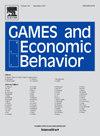A game-theoretic model of misinformation spread on social networks
IF 1
3区 经济学
Q3 ECONOMICS
引用次数: 0
Abstract
In this paper, we develop a game-theoretic model of sharing decisions among users of a Twitter-like social network. Agents have a subjective prior on an unobservable real-valued state, representing their beliefs on a topic that is subject to a binary action. Agents cast their binary action, matching the sign of the state. Before the action stage, a small fraction of agents receive a piece of news which impacts their beliefs. Those who receive the news update their belief and make a decision as to whether to share the news with their followers in order to influence their beliefs, and in turn their actions, given a fixed cost for sharing. We characterize the underlying news spread as an endogenous Susceptible-Infected (SI) epidemic process and derive agents' sharing decisions as well as the size of the sharing cascade at the equilibrium of the game. We show that lower credibility news can result in a larger cascade than fully credible news provided that the network connectivity surpasses a connectivity limit. We further delineate the relationship between cascade size, network connectivity, and news credibility in terms of polarization and diversity in prior beliefs: We demonstrate that increased polarization reduces the connectivity limit whereas larger in-party diversity has a non-monotone effect on the connectivity limit, which depends on both the levels of polarization and in-party diversity. Our results provide a theoretical foundation for recent empirical observations demonstrating faster and wider spread of low-credibility and false information on social networks.
错误信息在社交网络上传播的博弈论模型
在本文中,我们建立了一个博弈论模型,在一个类似twitter的社交网络的用户之间分享决策。智能体对不可观察的实值状态有主观先验,表示他们对受制于二元行为的主题的信念。代理执行它们的二进制动作,与状态的符号相匹配。在行动阶段之前,一小部分人会收到一条影响他们信念的消息。那些收到新闻的人更新他们的信念,并决定是否与他们的追随者分享新闻,以影响他们的信念,进而影响他们的行动,给定一个固定的分享成本。我们将潜在的新闻传播描述为一个内生的易感感染(SI)流行过程,并推导出代理的共享决策以及在博弈均衡时的共享级联的大小。我们表明,如果网络连接超过连接限制,较低可信度的新闻比完全可信的新闻会导致更大的级联。我们进一步描述了级联规模、网络连通性和新闻可信度之间的关系,即先前信念的极化和多样性:我们证明,极化增加会降低连通性限制,而更大的党内多样性对连通性限制具有非单调效应,这取决于极化和党内多样性的水平。我们的研究结果为最近的实证观察提供了理论基础,证明了低可信度和虚假信息在社交网络上的传播速度更快、范围更广。
本文章由计算机程序翻译,如有差异,请以英文原文为准。
求助全文
约1分钟内获得全文
求助全文
来源期刊

Games and Economic Behavior
ECONOMICS-
CiteScore
1.90
自引率
9.10%
发文量
148
期刊介绍:
Games and Economic Behavior facilitates cross-fertilization between theories and applications of game theoretic reasoning. It consistently attracts the best quality and most creative papers in interdisciplinary studies within the social, biological, and mathematical sciences. Most readers recognize it as the leading journal in game theory. Research Areas Include: • Game theory • Economics • Political science • Biology • Computer science • Mathematics • Psychology
 求助内容:
求助内容: 应助结果提醒方式:
应助结果提醒方式:


